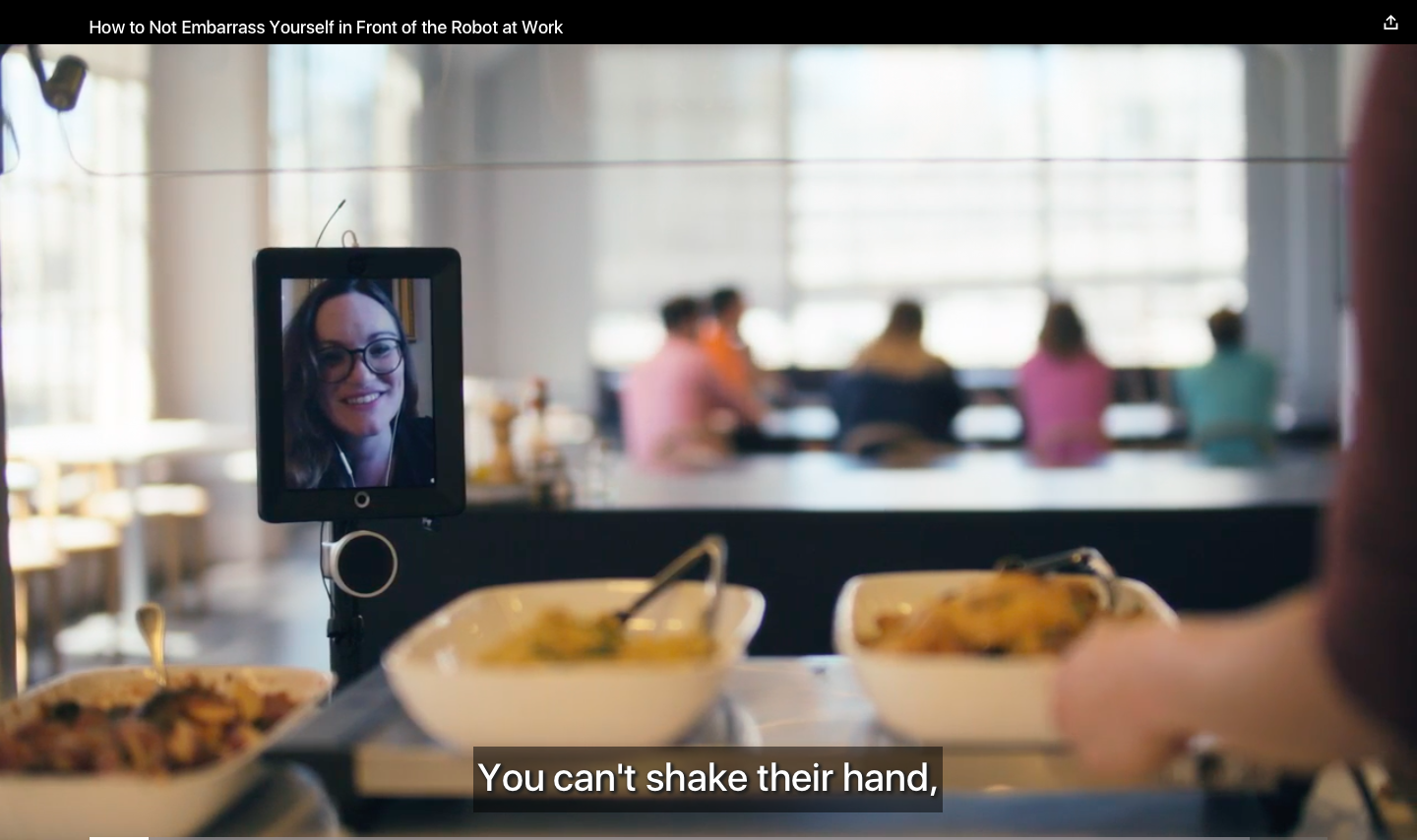Have breakfast with researchers at RMIT and be a telepresence robot in Melbourne!
You can just turn up (in the Sociology Kitchen, Bowland North B14 and/or at the links below) 14th September 8am-10am
If you have time to register: Help us plan by registering here
As part of a collaboration with colleagues at RMIT we are inviting you to a Breakfast (they will be having dinner). This will be a Virtual|Real event.
We’ll all be really here and there (in Lancaster’s Sociology Kitchen and in RMIT’s Digital Ethnography Lab) and really eating breakfast/dinner together. We’ll also be in virtual spaces to support some social interaction and research.
The research focus of this experiment is on on reimagining one of the most embodied, and materially dependent practices of attending a conference – the collective meal. We are attempting to take one of the less formal, difficult to digitally replicate, and potentially overlooked, but essential part of conferencing, and seeing how it can be practiced remotely.
Part of the event will take place on the Google Hangouts.
We will provide iPads where this is loaded, but you could also bring your own device (Links to the rooms are at the bottom).
Instructions to prepare in brief:
As a bare minimum, please follow this brief to do list:
Download the following apps onto the device you will be bringing to the breakfast (e.g. smartphone or tablet):
- Google Hangouts
- Google Calendar (used to access the hangouts easily)
- Skype (our contingency app)
- Take a photo on you commute and upload it to: https://docs.google.com/
document/d/ 1kKgWc7vHBCGF9O9nTJm1SQ8s_ BIfAhEnsbxxNaRIf2k/edit?usp= sharing - put some Reflections about the event, to be completed during or immediately afterwards: https://docs.google.com/
document/d/ 1lxstvgcASHrDkTRcmwNg4hyS3qluT wPVhgPV2i49FXo/edit?usp= sharing
More detailed description of the plan:
In Google Hangouts, we have a ‘Main Room’, where the main interactions will take place between all participants. Certain activities will require participants to split off into breakout ‘rooms’ for smaller group tasks. In this case, they will exit the main room and join a nominated ‘Breakout Room’, and conduct their group tasks in a different ‘virtual room’.
Both RMIT and Lancaster participants will all be in the same room at their respective locations with some video conferencing facilities available.
The event will begin with an introduction from Andrew, and an ice-breaking activity where we ask all participants to share a photo they took on their way to work that day. We wanted to have this type of activity to remind ourselves of the ‘locality of virtuality’ – that although we are meeting in a virtual space, and therefore transcending physical space in some sense, we are still embedded in our local area and time.
After this introduction, the event will consist of two main activities:
Activity 1: Remembering Conferences
Participants will recall and discuss memorable conferences / events they attended in the past that lent themselves toward facilitating collaboration. This will take place in a series of smaller discussion group (2/3 people), where RMIT & Lancaster people will pair up with a remote colleague in one of the Hangout ‘Breakout Rooms’. In each breakout group, participants will conduct mini interviews with each other for 10 mins each about memorable collaboration experiences at conferences, meetings, or other events.
These mini interviews will follow a semi-structured interview format, with the following guiding questions:
- The planning: who was invited and on what basis? Was there anything special about the location?
- The event: what format was the event? Did it deviate from ‘standard’ conference or symposium format?
- The interaction: how did the interaction become initiated? Did you approach them or vice versa? Where and how did this happen?
- Post-event: what followed the event that facilitated collaboration?
After these mini-interviews in breakout groups, groups return to the main Hangouts and RMIT participants will report back on their findings to everyone. The result will be a series of vignettes about how memorable collaboration has taken place in our experience, and therefore what might be required for virtual collaborative endeavours. These will be captured via audio at RMIT.
Activity 2 – The Conference Meal
This activity will be an attempt to have a conference meal virtually, attempting to replicate what is probably the least likely to be replicated part of a conference. Here we are experimenting with the intimacy of eating (casual, everyday practice) in a formal setting (video conference, meeting) that may lead to new ways of thinking about these types of interactions.
Both RMIT and Lancaster will have food arranged at this point – for Lancaster, breakfast / brunch, for RMIT, dinner.
The point of this activity is to ‘perform’ the conference meal, and see what limitations or opportunities are afforded by it’s co-locatedness. The aim is for participants to socialize just as one would at the ‘informal’ part of a conference, since this is repeatedly cited as one of the most valuable parts of attending a conference.
For this event, Lancaster participants can remain in the ‘Main Room’ or engage in interactions in any of the ‘Breakout Rooms’ we have set up.
Conversations will then be established with RMIT participants, but the devices can be passed around the room to converse with different people. This goes some way to mimicking the multiple one-to-one conversations that take place during conference dinners, rather than a centralized group conversation.
Participants will be encouraged to converse and act as though they were in a conference dinner or breakout space.
Conclusion
Following the conclusion of the breakfast/dinner, participants will reflect on the activity & dinner experience with a short series of questions. This will help us to think about future remote collaboration events, and what we might like to do differently next time.
Please upload your reflections here: https://docs.google.com/document/d/1lxstvgcASHrDkTRcmwNg4hyS3qluTwPVhgPV2i49FXo/edit?usp=sharing
Example reflection questions:
- Did you enjoy the experience?
- What does it mean to share food in different time zones?
- Does it create a new sense of sociality?
- Did any aspect of this exercise feel familiar, as one often experiences at conferences?
- Did eating breaking down barriers or hierarchies as it can elsewhere?
- In what way does the technology support or undermine the sociality?
- Did the inclusion of eating change the way you participated in this event? How?
Reflections will be used in possible outputs we might consider co-writing as a group (e.g. a group auto-ethnography of the virtual meal). Details of this output will be discussed in the final discussion.
Other Notes
We will have a dedicated ethnographic observer / recorder for this event, noting how the event unfolds and capturing observations. They will be capturing the event on camera, so we can produce a visual record of the event. Please let us know if you would prefer not to be on camera for this.
|
RMIT |
Participants arriving for the workshop |
LU |
|
1700 |
IntroductionsIntroduction from Andrew |
0800 |
|
1715 |
Mini-Interviews2 x 15 mins or 3 x 10 mins. |
0815 |
|
1745 |
Reporting back, collating responses |
0845 |
|
1800 |
Dinner / Breakfast |
0900 |
|
1845 |
Reflection & Discussion |
0945 |
|
1900 |
End |
1000 |
Links to rooms
Main Room
https://hangouts.google.com/hangouts/_/amnnwyylnzetbg4vxxrmq5apvie
We also have several breakout rooms, which will be used for the mini-interviews part of the event, or any other time in which you would like to have a private discussion with someone. You will receive instructions on who should access which of these rooms. These will also have separate invitations in your Google Calendar so they can be accessed easily.
Room 1
https://hangouts.google.com/hangouts/_/weblsireozcuvndwn7solv2hnee
Room 2
https://hangouts.google.com/hangouts/_/uvom3nygzzhpxlsf25hvwi3p3me
Room 3
https://hangouts.google.com/hangouts/_/4dleq5v2trb6dk7gnogctqw62ye
Room 4
https://hangouts.google.com/hangouts/_/s2jnuv6ydfamle3bwhmocr3fzme
Image Source: https://www.wired.com/2015/09/my-life-as-a-robot-double-robotics-telecommuting-longread/




